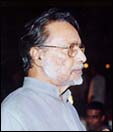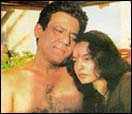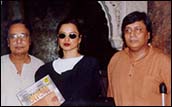|
June 24, 1997
QUOTE MARTIAL
MAKING WAVES
SHORT TAKES
ROUGH CUTS
MEMORIES
ARCHIVES
MOVIES CHAT
|
The passing of a legend

|
|
Basu Bhattacharya
|
"The movie will begin in 5 moments"
The mindless Voice announced
"All those unseated, will await
The next show"
We filed slowly, languidly
into the hall. The auditorium
was vast, & silent.
As we seated & were darkened
The Voice continued:
"The program for this evening
Is not new. You have seen
This entertainment thru & thru.
You've seen your birth, your
Life & death; you might recall
All of the rest -- (did you
Have a good world when you
Died?) -- enough to base
A movie on?"
---Jim Morrison
Film-maker Basu Bhattacharya died at 15 minutes past twelve on a rainy night.
Stunned friends, admirers, artistes, family members assembled at the electric crematorium, speaking in low voices while pressmen wandered around asking questions about the late director to the mourners.
Camera crews proliferated, obtruding on the family's grief, trying to get close-ups of the film-maker, until Bhattacharya's daughter Anvesha pleaded with them to leave the family alone.
Basuda's hits
Teesri Kasam, his first film is a love story involving a simple bullock cart driver, Hiraman (Raj Kapoor), and Hirabai (Waheeda Rahman) a nautch girl. Teesri Kasam, which took a long time to make, won Bhattacharya the President's award.
The first of a trilogy, Anubhav is about a newspaper editor Amar (Sanjeev Kumar) whose work consumes his attention leaving his wife Mansi (Tanuja) lonely and frustrated and she starts sharing a sympathetic relationship with another man.
Avishkar has Rajesh Khanna and Sharmila Tagore playing Amar and Mansi who have started to take each other for granted and begun to drift apart. The film is about the discovery that though you may have drifted apart you are still together and marriage is a bond where you can come back together if you discover that you cannot do without each other.
Griha Pravesh (The Homecoming) is about the seven-year-itch. The other woman (Sarika) enters the life of Sanjeev Kumar (Amar), as his wife Sharmila Tagore (Mansi) spends more time saving up for a house instead of concentrating on her own appearance. Once she realises this, she reverses the trend. And Amar comes back home after he realises that there is more to marriage than sex.
Bhattacharya's latest film Aastha is about how a woman's unsatisfied economic needs make her compromise herself, until she realises that material objects are transitory. This time Amar and Mansi are played by Om Puri and Rekha.
|
Among those present were writer-director-poet Gulzar, who along with Basuda was part of the group that came along with Bimal Roy to Bombay in the early 1950s. Their friendship lasted over four decades,

|
|
Om Puri and Rekha in Aastha
|
" We have been together since the early 50's. Ours was a guru-bhai relationship because Basuda was my senior. We had long poetry sessions where I would read out my Urdu poems to him and he would come up with some more literature. We would have tiffs at times about issues we disagreed on. I wrote his latest film Aastha."
Om Puri, who played the lead role in Aastha, says, "I have been an ardent admirer of dada's work since I was a drama student in the NSD (National School of Drama) in '71." He thinks Bhattacharya's Teesri Kasam was a cinematic masterpiece. "Actually, dada wanted me to work with him earlier on a project called Shamshan (Graveyard) but it never took off. His influence on Indian cinema cannot be gauged so easily."
Basu Bhattacharya influenced a whole generation of film-makers, Amol Palekar acknowledges the debt. "The industry has lost a friend, a guide and a philosopher. He was older to me but that never ever inhibited our friendship. He was a contemporary of mine and his works have inspired a whole generation of film-makers of parallel cinema."
Basuda's style of functioning while shooting involved first creating a congenial atmosphere for his artistes. He insisted on natural performances. Puri laughs softly as he recalled, "He wouldn't say anything while you were in front of the camera. He was very open to discussion but if he had some idea in mind, then he would just dismiss any suggestions. But he always knew what he was doing; his knowledge was never limited to just one particular subject."

|
|
Basu Bhattacharya with Rekha
|
This fact impressed the doctors of the Lilavati Hospital in suburban Bandra who used to complain about Basuda being a very bad patient, recalls Puri. "They bitched a lot about him but even they were stunned by the knowledge he had about the human body. I wish he had taken more care of himself. It was too early for him to go."
All of Basuda's films affirm a belief in the institution of marriage, though his own, with Rinki, Bimal Roy's daughter, was a troubled one.
Noting the delay to begin the cremation, director Sudhir Mishra remarked, "Had Basuda been here, he would have shouted in his Bengali accent Kya karta hai, jaldi karo."
As if on cue, the proceedings began, the last rites were read and the body was lifted and taken towards the gaping mouth of the electric machine. Everyone looked on. It was Basuda's last shot.
Basu Bhattacharya dead
|

